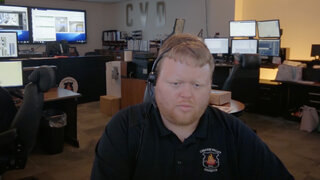Create a free profile to get unlimited access to exclusive videos, breaking news, sweepstakes, and more!
'It's Not Just A Job': What It's Actually Like To Work At A 911 Dispatch Center
Oxygen's series, "911 Crisis Center," reveals what an average shift at Chagrin Valley Dispatch in Ohio is like. Spoiler: It's tense, stressful — and immensely rewarding.

This article has been updated to reflect the 2022 season of "911 Crisis Center."
When someone is choking, what do you do? What if there's a fire? Or gunshots at the neighbor's house? What if someone is about to deliver a baby?
We don't blame you if you wouldn't know how to properly handle even one of those scenarios. But for 911 dispatchers, they have to know what to do — and how to give someone the proper instructions, all done over the phone without the benefit of eye contact and hand gestures.
Working as a 911 dispatcher is no ordinary job, as you'll see in Season 2 of Oxygen's series "911 Crisis Center," premiering Saturday, Sept. 3 at 9:30/8:30c with new episodes airing at 9/8c beginning Sept. 10. The show takes place at the dynamic Chagrin Valley Dispatch, a nationally regarded emergency call center in Bedford, Ohio. The center of the action revolves around the responders’ calm demeanor, quick thinking, and ability to draw out essential information from callers in the midst of extreme situations is often the difference between life and death.
So, in advance of the upcoming season, take a peek at what life is really like inside an emergency dispatch center.
What To Know About A 911 Dispatch Center

"Welcome to Chagrin Valley Dispatch Center. This is the heartbeat of the cities that we dispatch for. All 17 police, fire, and EMS," Charline Polk, a dispatch supervisor, explains in the clip above.
Police, fire, and EMS (emergency medical services) are the three main prongs of emergency dispatch, and dispatchers have to know which branch (if not all of them) to alert when a call comes in. Geography is also a crucial part of the job, one dispatcher explains — you have to understand which station is closest to the emergency situation.
So, how do they figure it all out? Well, when a call comes in, it displays the number, a name if possible, and either an address if it's a landline or the closest cell tower, so the dispatchers have an idea of where the call is coming from. Dispatchers have eight monitors in front of them during a shift, which sounds like a lot — until you realize how much information they have to gather, relay, and record.
While extracting what they need to know from callers and offering any necessary instructions, the dispatchers are also putting it all down into the Computer Aided Dispatch (C.A.D.) and passing the information over to a second dispatcher, who is alerting police, fire, or EMS to the situation and relaying what they need to know. Tools for the job include the aforementioned monitors, head sets (often bedazzled at Chagrin Valley Dispatch for flair), and foot pedals that help them switch over between tools.
"I think the most difficult thing about this job is multitasking. You have nine people in a room and you're listening to a radio and you're listening to a phone call and at the same time, you have somebody talking to you on the phone with the 911 call, the radio going off, and somebody in person asking questions to ask your caller," Matt Reinke, a 911 dispatch trainee, said.
"You have to be like an octopus," Polk agreed.
911 Dispatcher Training 101

But don't worry — dispatchers have to go through rigorous training before they're manning the phones alone.
After applying, potential employees are invited to a shadow interview, where they can see firsthand what exactly happens during a shift. Not everyone wants to go forward after witnessing the high pressure environment, but plenty do. The next step is a formal interview, and if you're hired, it's time to embark on training.
Trainees are given a very thorough manual, which has instructions for everything from administering CPR and treating a stab wound to delivering a baby. Trainees are also paired with a trainer, who keeps a close eye on them and offers tips and advice at the end of the day, highlighting what they did right and what they need to improve on. They're evaluated on every shift and rated on their performance.
Training can last anywhere from a few weeks to a few months, depending on the person. Once it's completed, trainees at Chagrin Valley Dispatch get to celebrate with a small party and some cake. It's an exciting moment that required plenty of patience, hard work, and a strong mindset to get to.
Meet Chagrin Valley's Dispatchers

"911 Crisis Center" allows viewers to really get to know the voices on the other end of the phone call, like Lushonda Hall, who has been working as a dispatcher for 14 years. "I think it was my natural instinct to be a dispatcher. I just like helping people in their time of need," she said.
Not everyone intended to become a dispatcher, though. Essence Sullins, who's been dispatching for seven years, explained, "I got into the field of dispatching by accident. I ended applying for this job thinking I was gonna be doing data entry. I didn't know what it was, what it entailed, anything. I just needed the job. I love it and I love what it does for me on a personal level being able to help people, being able to work with the people I work with."
The dispatchers' lives aren't fully defined by their work, though, as all-consuming as it may appear to be. Polk has a popcorn business on the side, and regularly brings in new flavors for her co-workers to sample. Nancy Woodruff, who's been in dispatch for 30 years and is described by Polk as the "one who keeps us laughing," treasures her life with her husband, a police officer. Melanie McCavish, who's been an emergency dispatcher for 18 years, teaches self-defense classes on the side and enjoys riding her motorcycle.

But still, the job is a critical element of their lives. "It's not just a job. There's a lot of caring that goes into it — not only for the public, but for my team that's helping to save the public," Polk said.
Polk, who is a supervisor, takes her role seriously: "Being a supervisor, you kind of go into the mommy bear mode. Your dispatchers are your cubs. You want to protect them, make sure they're good."
While there are some men who work at Chagrin Valley Dispatch Center, it's a place with a lot of female energy,
"This field is largely dominated by women. I think the biggest reason why is they're extremely emotionally intelligent," Reinke mused.
Friendships And Stress

"This job is a lot. It takes a toll on your body and soul. You have to be able to balance life, work, work, work, kids, life," Woodruff explained.
Many of the dispatchers have admitted to being shaken by some of the calls they've received, especially if they end with someone dying or being seriously hurt. And even if a call goes well, there is still a lot of being yelled at, a lot of pressure to remain calm and do the job right, and general stress.
"People aren't calling us because they're having a good day. They're calling us because they're having the worst day of their lives," Arnold Rinas, a dispatcher for 15 years, said.
It's the kind of environment that could definitely tax someone's mental state. Luckily, many of the workers are close friends, and they use jokes, laughter, snacks, and comforting words to make it through a shift. Many elect to join the Peer Support Program, which allows them to identify the body language and tone they should look out for, and the advice they can give to employees who seem stressed or burnt out, whether it be breathing exercises or other techniques.
Dispatchers also go through PTSD training, so they can have the tools they need to talk about the tough moments on the job and how it may have impacted them.
Above all else, "self care is so important. You have to make that time for yourself," McCavish stated. For some, that's spending time with family. For others, it's indulging in hobbies. And for many of the dispatchers, it's making time for their canine companions. A lot of Chagrin Valley Dispatch workers turn to their dogs to help them wind down from a tough day on the job.
What To Expect From "911 Crisis Center"
On "911 Crisis Center," viewers will get to see what exactly goes on in a shift — from the moments of agony and the celebrations of relief. The dispatchers work to solve all kinds of crises and send help to those who need it. They respond to calls about missing children, reports of gunshots, threats of violence, choking situations, and other serious medical emergencies. And they do it all while keeping their cool, despite the immense stakes.
The show will also highlight the quieter moments of working in such a high-pressure environment, including the friendships between the ladies, the moments of levity they create, the parties they throw, and the way they shake off a shift.
And of course, they try to heed the ever-present warning to never, ever jinx a shift by saying things seem “quiet” at the call center.
Catch the Season 2 premiere of "911 Crisis Center" on Saturday, Sept. 3 at 9:30/8:30c with new episodes airing at 9/8c beginning Sept. 10.



























